Audi Hungaria Community
We are committed to progress
„At Audi Hungaria, we are currently in the middle of a major transformation process that encompasses a number of changes, challenges and opportunities, which is why the supportive power of our community is more important than ever. The sense of responsibility that we feel towards each other, both as a company and as colleagues, will help release our creative energies. This is the key driving force for change, and it drives every minute of our working lives.” explains Kinga Németh, board of management member responsible for human resources and organisation.
It is a basic human need to be a part of secure, supportive communities that aid our development. In an increasingly fast-changing and challenging world, the communities that succeed are those where diversity is bound together by mutual respect, adequate communication and cooperation. In its 30-year history, Audi Hungaria has always believed the key to sustainable competitiveness is to have a highly expert, cohesive, supportive and constantly improving workplace team, as well as a diversified social presence. In other words, we need a ‘fully networked’ community that, through agile learning, is able to rise to meet the requirements of Next Level.
How are the e-transformation and the shift into a competence centre reflected in the company’s responsibility towards its employees? Because everyday work and competency development go hand in hand, we will equip our colleagues with new competencies to help develop culture by creating the conditions for a diverse and competitive workforce, where people are open to innovation and to each other, ready for the challenges of the future.
At Audi, it has always been essential to
take responsibility for the wider environment.
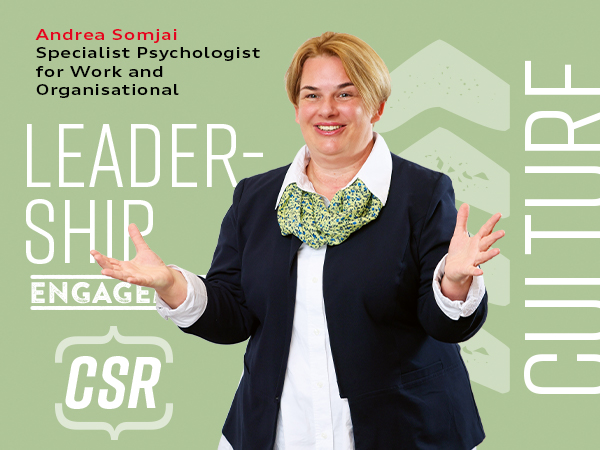
“Whether you want it or not, change will happen,” says Specialist Psychologist for Work and Organisational Andrea Somjai, who has dedicated herself to developing the culture of the company. Andrea also responds to the question of how we will be affected by the transformation, and how the corporate culture is evolving to ensure our employees continue to see Audi Hungaria as an attractive employer, where they are happy and highly motivated to work: “I don’t believe in standing still. Even if we don’t know what will happen, the worst thing you can do is to do nothing. If you take action, then you feel like you can influence how things turn out. Everyone is responsible for their own surroundings, everyone is capable of doing something. This is why our company also provides several centralised programmes, such as the Role Model Programme. Managers involved in this programme are permitted to do anything that reduces the distance between different levels of the hierarchy and brings people closer together.”
But we also look to have an impact outside the factory itself: at Audi, it has always been essential to take responsibility for the wider environment. For example, our colleagues have many opportunities to engage in charitable activity, including outside of working hours. During the October Month of Good Deeds they are able to visit addicts, people with disabilities, homes for the elderly and Ukrainian refugee children, and they can also donate to the Adni jó! (‘Giving is Good’) programme. “Beyond the social benefits, volunteering is also a constructive activity for the individual. It’s a chance to work in a different way, to get to know groups from completely different walks of life, and also to share a common cause with people from diverse areas of the factory. This is also crucial to personal development.”
We always ask our colleagues
to be open and curious about
the transformation.
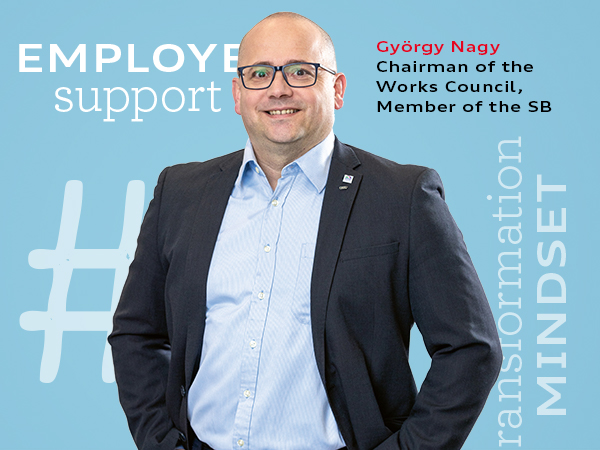
In addition to the human side, the desire for openness and to set a good example, it is just as important to acquire the necessary skills and abilities, with appropriate guidance. “Though transformation is already a part of the daily lives of some workers, the full impact on our colleagues as a whole is still ahead of us,” says György Nagy, chairman of the Works Council. “In this process, it is important to recognise that our colleagues are not merely passive agents of change – they also have the opportunity to shape their own future through their personal approach. We always ask our colleagues to be open and curious about the transformation. At Audi Hungaria, we have been driven by constant change and challenges since the very start, which is why we have the competencies, such as expertise, experience and flexibility, needed to manage change. I am confident we will also be able to cope with the changes currently taking place.
“It is essential that we also feel a sense of openness and involvement on the part of management, who should have an attitude that makes it clear we have a shared responsibility in shaping the future. As an employer, Audi is obliged to keep the collective whole informed in a transparent way about the security of their continued employment, so individual employees feel a sense of stability and that their livelihoods are not at risk. The company will also provide the training necessary to make the transition, including skills training for the manufacture of electric vehicle parts and other, non-technical programmes. Skills such as good communication, listening to and understanding the other person, are crucial at a time like this, and can help ensure a smooth transition. As the Works Council, it is our role to identify the challenges and play an active part in finding solutions. Together with management, it is our shared task and responsibility to ensure that our colleagues benefit from the transition.”
But what does this mean in practice? Exactly what training opportunities can employees choose from to enjoy a successful experience during this transformation?
Individual responsibility and experiential learning
will play a bigger role, which is why at Audi we ensure
we provide the right learning ecosystem.
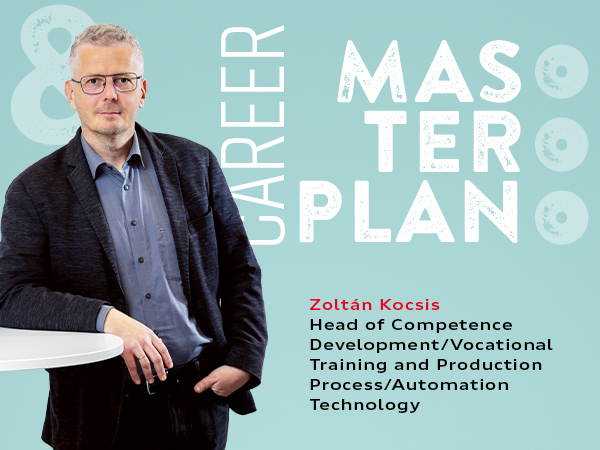
Zoltán Kocsis, Head of Competence Development/Vocational Training and Production Process/ Automation Technology at Audi Academy, describes the training opportunities for the transformation. “Almost all areas will be affected by the transformation, and we will provide opportunities for retraining within the company. The world of education is also changing, with web-based training and blended or mixed-methods learning now available in addition to formal training. New forms of learning are emerging, such as collaborative learning and gamified (playful, experience-centred) education. Individual responsibility and experiential learning will play a bigger role, which is why at Audi we ensure we provide the right learning ecosystem. In addition to training and education, staff are also supported in their daily work by apps and videos to help them learn and work more effectively.
“A classical linear training path can be built up to learn a new technology, such as the electrical rewards system, for example. In an increasing number of fields, we are also offering participants a Learning Journey, with options for individual or group training. This is why we have created, for example, the Moodle system for vocational training, online learning materials for competence development for purchasers, and made self-directed and online soft skills development available at company level with the help of Masterplan.
“In vocational training, one tangible result of our training improvements is our methodological development programme for mandatory training, which received the German-Hungarian Chamber of Industry and Commerce’s Vocational Training Award in the Innovation category. Our preparations for the future are based on institutional cooperation. We are particularly proud of the establishment of the Győr Knowledge Transfer Centre in September 2022, through the participation of Széchenyi University, the Győr Vocational Training Centre and Audi Hungaria. We are working on the interoperability of the training system, offering a career path from vocational training to higher education and then to the world of work.”
Developing knowledge and competence
is of great value to both
the individual and the company.
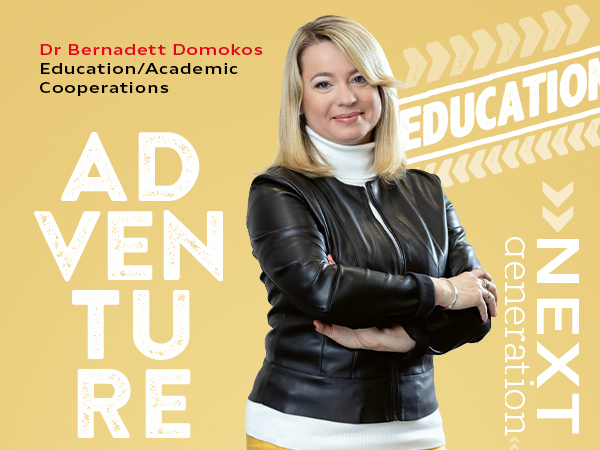
In addition to staff development and retraining, another important ‘arena’ is ensuring the right preparation for our future colleagues. In this regard, Bernadett Domokos, who is responsible for education/academic cooperation, spoke about the relationship between corporate responsibility and competence development.
“Diversity can be understood not only in terms of people, but also knowledge. Developing knowledge and competence is of great value to both the individual and the company. In our fast-paced world, knowledge acquired ten or twenty years ago can sometimes be outdated. This is why, as a company, it is our responsibility to our current and future employees to ensure we initiate higher education courses and develop corporate programmes that prepare members of both target groups for the challenges of our enterprise. We currently boast several partnerships with higher education and research institutions in Hungary, including the Audi Development Camp for international students, with our strategic partner Széchenyi István University, and supporting young talent from Formula Student teams and also students working at our company. With the active involvement of our staff, we have been fully involved in university education for ten years now, and we have taken the initiative to offer students countless learning materials featuring new approaches. In addition, with our Professor-Mentor programme, more than 50 university lecturers have been introduced to our technologies and processes in order to help develop their own learning materials. We have also been involved in the development of countless higher education training programmes over the years. In particular, we are especially proud of the SAP training we have launched together with our partner university – thanks to the active involvement of our colleagues in IT. The subject matter is unique among Hungarian higher education courses.”
It’s essential to create
a community that embraces
a range of different perspectives.
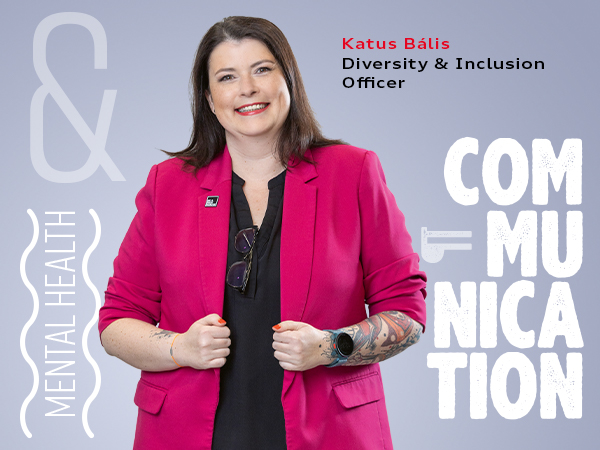
However supportive the work environment might be, transformation is never easy. Our company pays attention to the human side, too. Diversity and inclusion officer Katus Bális, who represents the ‘soul’ of our company, talks about how to build a diverse but cohesive community. “Whether we’re talking about a family, a company or an entire society, change is always stressful for people. It is hard to deal with uncertainty and to accept that we don’t know if we will be able to cope with our new responsibilities. Support means feeling like we are not alone with our problems, and that colleagues can turn to each other for help, including with personal issues. There is great strength in accepting we will stand by someone if they are in a slightly worse situation than we are, and that in return they will not let us down either. At Audi Hungaria, our priority is to give our colleagues the support they need. We now have a range of health promotion programmes and training available, as well as access to a company psychologist.”
Bális also tells us that, although it takes more energy to get started in a heterogeneous environment, this will pay off over time. As the creative processes grows more effective, there is more room for innovation, and many more new ideas are generated. “We now have several types of training and a series of talks on diversity and inclusion, because it’s essential to create a community that embraces a range of different perspectives. But we can’t do this without setting a personal example, without living the principle of acceptance in our everyday lives, and being mindful of the way we treat each other. Our behaviour is a powerful force, and a supportive work environment is built on countless small, specific positive examples.”
